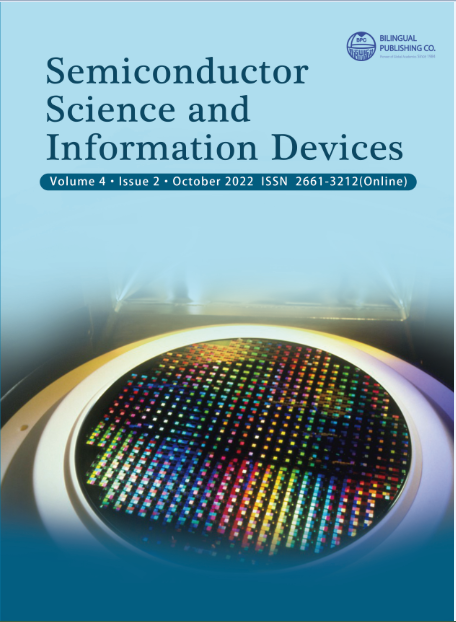Experimentation on Optimal Configuration and Size of Thin Cylinders in Natural Convection
DOI:
https://doi.org/10.30564/ssid.v4i2.4720Abstract
In this paper, an experimental study of laminar, steady state natural convection heat transfer from heated thin cylinders in an infinite air medium has been reported. Two electrically heated cylinders having the same slenderness ratio (L/D) i.e. 6.1 but different diameters i.e. 3.8 cm and 5.08 cm were used. 105 experiments were carried out to study the effect of diameter and inclination angle of thin cylinder on natural convection heat transfer. After mandatory corrections of radiation and endcap heat losses, convective heat transfer results were presented in the form of local and average dimensionless numbers. For vertical configuration of thin cylinder, Nusselt number was varied from 52.99 to 95.10 corresponding to 1.28×108≤Ra*L≤1.08×1010. While for horizontal configuration,Nusselt number was varied from 10.74 to 17.78 corresponding to 9.42×104≤Ra*D≤8.17×106. Results were compared with the published data and found satisfactory as the maximum percentage difference was only 3.09%. The essence of research is that the heat transfer coefficient increases with decrease in diameter and increase in inclination angle. Smoke flow visualization was done to capture patterns of fluid flow. Finally, comparison was made to quantify increase in Nusselt number from slender cylinder as compared to the flat plate.
Keywords:
Natural convection; Thin cylinders; Flat plate; Nusselt numberReferences
[1] Popopiel, C.O., 2008. Free Convection Heat Transfer from Vertical Slender Cylinders: A Review. Heat Transfer Engineering. 291(6), 521-536. DOI: https://doi.org/10.1080/01457630801891557
[2] Popiel, C., Wojtkowiak, J., Bober, K., 2007. Laminar Free Convective Heat Transfer from Isothermal Vertical Slender Cylinder. Experimental Thermal & Fluid Science. 32(2), 607-613. DOI: https://doi.org/10.1016/j.expthermflusci.2007.07.003
[3] Cebeci, T., 1974. Laminar Free Convection Heat Transfer from the Outer Surface of a Vertical Slender Circular Cylinder. Fifth Int Confer, Tokyo, Japan.
[4] Incropera, F.P., Dewitt, D.P., Bergman, T.L., et al., 2012. Fundamentals of Heat and Mass Transfer, John Wiley and Sons.
[5] Churchill, S., Chu, H., 1975. Correlating Equations for Laminar and Turbulent Free Convection from Vertical Flat Plate. International Journal of Heat and Mass Transfer. 18(11), 1323-1329.
[6] Oosthuizen, P.H., Paul, J.T., 2006. Natural Convective Heat Transfer from a Narrow Isothermal Vertical Flat Plate. Proceedings of the 9th AIAA/ASME Joint Thermophysics and Heat Transfer.
[7] Oosthuizen, P.H., Paul, J.T., 2007. Natural Convective Heat Transfer from a Narrow Vertical Flat Plate With a Uniform Heat Flux at the Surface. Proceedings of ASME-JSME Thermal Engineering Heat Transfer Summer Conference Collocated with the Asme Interpack Conference.
[8] Sparrow, E., Gregg, J., 1956. Laminar Free Convection Heat Transfer from the Outer Surface of a Vertical Circular Cylinder. ASME. 78, 1823-1829.
[9] Yang, S., 1985. General Correlating Equations for Free Convection Heat Transfer from a Vertical Cylinder. International Symposium on Heat Trans, Peking.
[10] Al-Arabi, M., Khamis, M., 1982. Natural Convection Heat Transfer from Inclined Cylinders. International Journal of Heat & Mass Transfer. 25(1), 3-15.
[11] Riaz, A., Shah, A., Bait, A., et al., 2019. Experimental Study of Laminar Natural Convection Heat Transfer from Slender Circular Cylinder in Air Quiescent Medium. International Bhurban Conference on Applied Sciences and Technology, Islamabad, Pakistan.
[12] Nusselt, W., 1929. Die Wärmeübgabe Eines Waagrecht Liegenden Drahtes Oder Rohres In Flüssigkeiten Und Gasen. Ver Deut Ing. 73, 1475-1478.
[13] Morgan, V.T., 1975. The Overall Convective Heat Transfer from Smooth Circular Cylinders. Advances in Heat Transfer. 11, 199-264.
[14] Dyer, J., 1965. Laminar Natural Convection from a Horizontal Cylinder with a Uniform Convective Heat Flux. Trans Inst Eng Aust. pp. 125-128.
[15] Oosthuizen, O., Mansingh, V., 1986. Free and Forced Convection Heat Transfer from Short Inclined Circular Cylinders. Chemical Engineering Communications. 42(4-6), 333-348.
[16] Al-Arabi, M., Salman, Y., 1979. Laminar Natural Convection Heat Trnasfer from an Inclined Cylinders. International Journal of Heat & Mass Transfer. 23, 45-51.
[17] Cengel, Y.A., Ghaja, A.J., 2014. Heat and Mass Transfer, Fundamentals and Application, 5th ed., McGraw- Hill Education.
[18] Holman, J., 2002. Heat Transfer, vol. 9th, McGraw Hill.
[19] Chughtai, I., Natural Convection Heat Transfer Through Vertical Heated Cylinder Assemblies, Islamabad, Pakistan, 2016.
[20] Shaukatullah, H., Claassen, A., 2003. Effect of Thermocouple Wire Size and Attachement Method on Measurement of Thermal Characteristics of Electronic Packages. 19th IEEE SEMI-THERM Symposium.
[21] Lee, J.B., Kim, H.J., Kim, D.K., 2016. Experimental Study of Natural Convection Cooling of Vertical Cylinders with Inclined Plate Fins. Energies. 9(6), 391. DOI: https://doi.org/10.3390/en9060391
[22] Lee, H., Chen, T., Armaly, B., 1988. Natural Convection Along Slender Vertical Cylinder with Variable Surface Temperature. Journal of Heat Transfer. 110, 103-108.
[23] Jarall, S., Campo, A., 2007. Experimental Study of Natural Convection from Electrically Heated Vertical Cylinders Immersed in Air. Experimental Heat Transfer. 18(3), DOI: https://doi.org/10.1080/08916150590953360
[24] Rohensow, W., Ganic, E., Cho, Y., 1998. Handbook of hea trasnfer, 3rd ed., New York: McGraw-Hill.
Downloads
How to Cite
Issue
Article Type
License
Copyright © 2022 Ali Riz, Adnan Ibrahim, Muhammad Sohail Bashir, Masrour Asghar, Muhammad Abdullah, Ajmal Shah

This is an open access article under the Creative Commons Attribution-NonCommercial 4.0 International (CC BY-NC 4.0) License.




 Aims and Scope
Aims and Scope Ali Riaz
Ali Riaz





